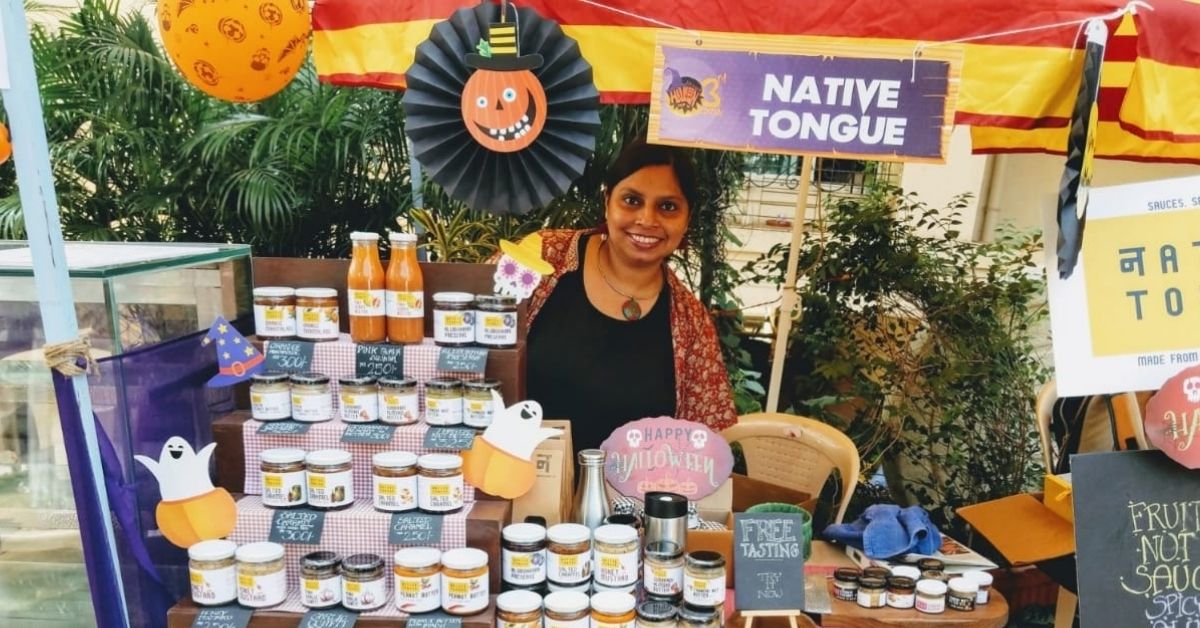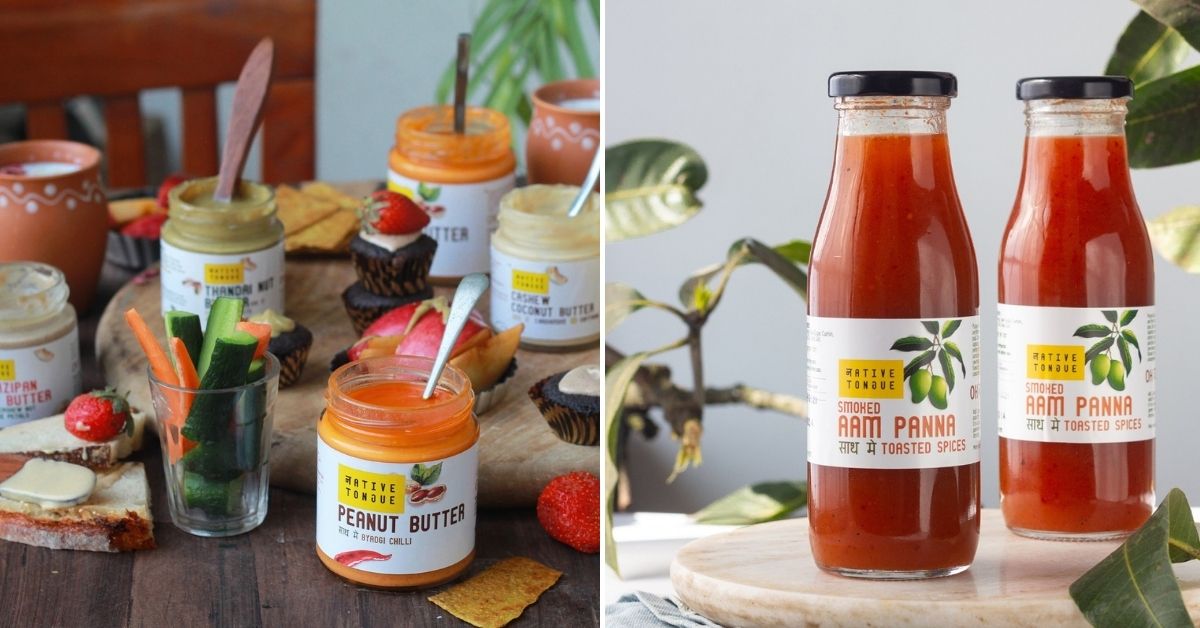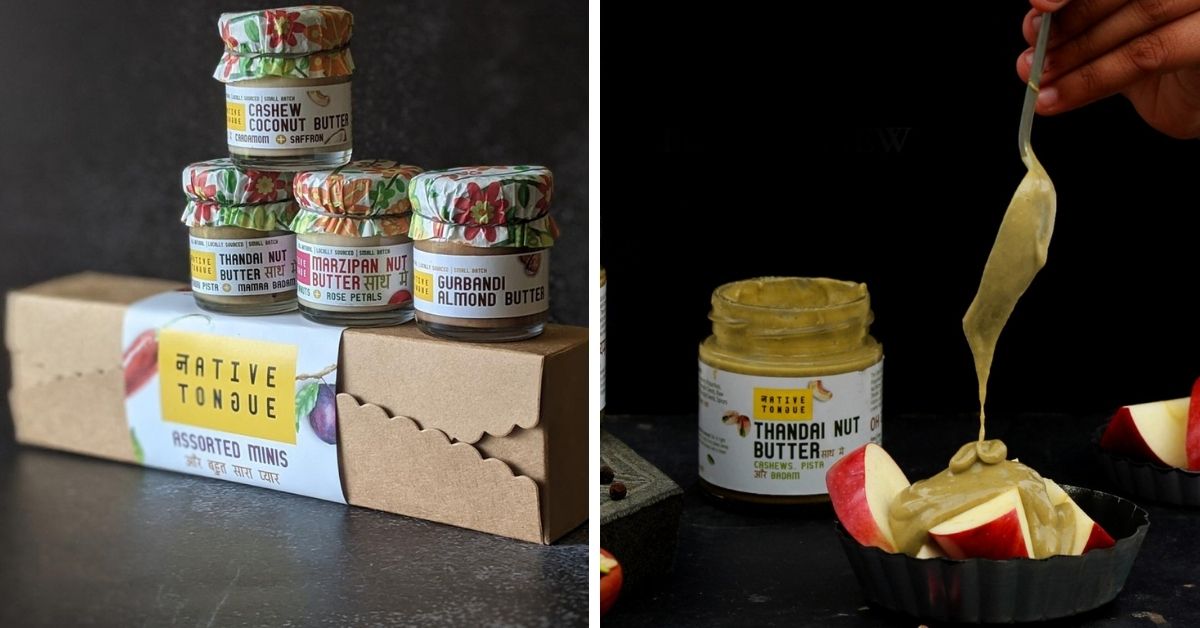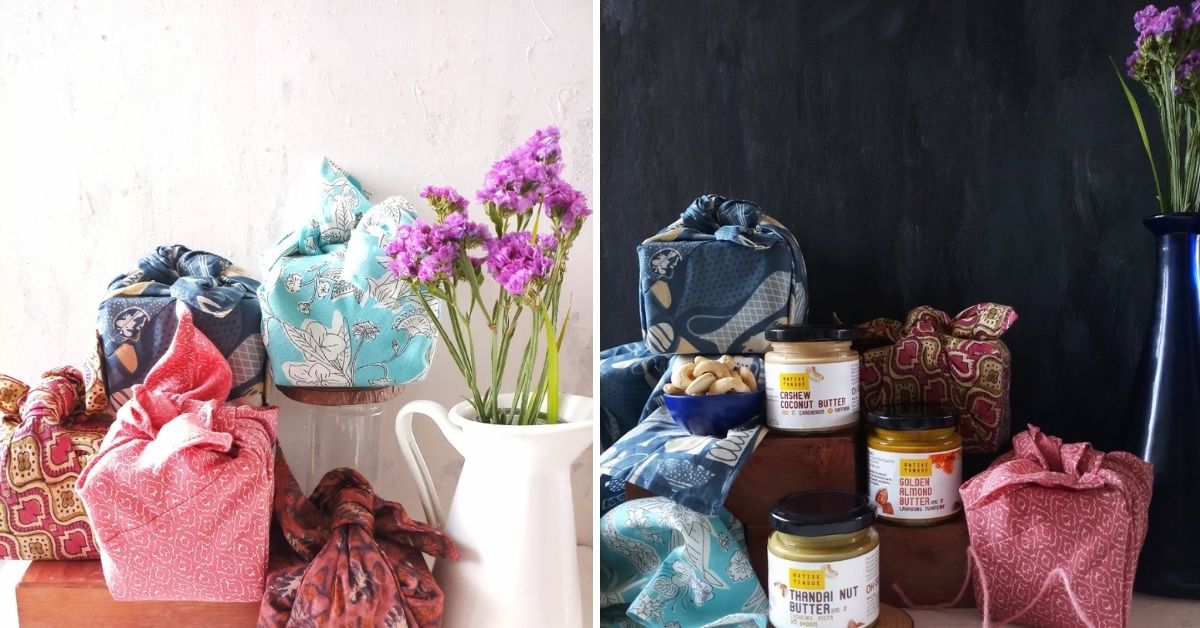40-YO Woman’s All-Natural Spreads With Rare Indigenous Produce Get 1500 Orders/Month
Ruchira Sonalkar from Mumbai runs Native Tongue with her husband Rohan, wherein they sell all-natural and preservative-free jams, stone ground nut butters, savory spreads, fruit cordials and dessert sauces made from lesser-known indegenous produce, and ship them all over the country.

From the heart of Mumbai comes a unique amalgamation of childhood memories and nostalgia with modern jams and spreads. These products are reminders of the delicious evening snack of guava sprinkled with chilli, shengdana chutney to go with dosas, idlis, and uttapams, or samosas and pakoras dipped in kasundi mustard and are the result of city-based Ruchira Sonalkar’s culinary prowess.
The 40-year-old, along with her husband Rohan, runs the Native Tongue, which offers a wide spread of jams, stone ground nut butters, savory spreads, fruit cordials and dessert sauces. Ruchira says she was never a professional chef, but always held cooking close to her heart. For 13 years, she worked as a product head for a digital news company before she quit in 2014 to care for her baby. Her sabbatical further familiarised her with the culinary world, when she started hosting pop-ups of lesser-known Maharashtrian recipes. From here, she diversified into jams and sauces.

Her first break came when she was asked to prepare spreads for a friend’s baby shower. “It was our first order, and we received tremendous response. More people subsequently reached out to us and that’s how our journey began. We floated our first brand, Jam Packed, in 2018,” Ruchira tells The Better India. Rohan continued with his job and helped Ruchira out whenever he could, while she took on the business full-time.
For the love of India’s lesser-known produce
“We did everything in-house, from recipe formulation to printing out the labels. We started with six flavours — strawberry jam, salted caramel, rum caramel, honey mustard, peanut butter with chillies, and garlic confit. It was our pilot run, to see if these flavours would be interesting. The response was phenomenal. People who had never eaten peanut butter liked our product with chillies, because it reminded them of shengdana chutney,” she says, adding, “Peanut butter could connect with a 20 year old as well as a 50 year old. There’s also the honey mustard that was a spin on kasundi.”
Ruchira says there are many varieties of lesser-known indegenious produce in India that do not get their due. “We picked ingredients that either had a GI Tag, or something special about them, with the idea of invoking flavours that had a sense of nostalgia. For example, we made aam panna with rajapuri keris (mangoes). People knew what aam panna (mango drink) was, but we wanted to talk about the produce behind it. We tried to put interesting spins like fire roasting the keris, which adds a smoky aroma and makes it more chatpata (piquant). So you can consume it as a beverage, or use it in paani puri, because it has a flavour that’s similar to jaljeera (a popular summer drink). We also made mulling spices with gondhoraj lime. Many people are familiar with kaffir lime, which comes from China, but gondhoraj is a close cousin, yet many don’t know too much about it,” she adds.
Ruchira and Rohan work with farmers who had small land-holdings to acquire produce. For example, their strawberries come from a small organic farm in Nashik. Peanuts for their butter come from a 75-year-old grandmother in their building who runs a groundnut business and sources her peanuts directly from Kathiawar. Similarly, they source their guavas and mulberries from organic farms as well.
“Our point is also to highlight the subtle and changing nuances of the produce, depending on varying seasons and territories,” she says. Native Tongue currently has 22 flavours across a variety of products. “We introduced fig relish, and the GI-tagged figs were sourced from a farm in Purandar in Maharashtra. They are very flavourful, which reflects in our final product.”
A diverse range of delicious spreads

In December 2019, the couple changed the name of their business to Native Tongue. “Only 20-30% of our products were jams, so we wanted to name our business something that showcased our range,” Ruchira explains. Till then, all operations were being managed from a small kitchen, of about 180 square feet. She adds, “When we scaled up, we moved to a third-party manufacturing unit in January 2020 and gained good momentum. But within three months, the whole picture changed when the pandemic was declared. Thankfully, we didn’t have our own investment in the place, so we could return to our previous space.”
Native Tongue kept the ball rolling during the pandemic and with renewed focus during the time on eating local and preservative-free food, the business flourished. “In January this year, we were able to shift to a 1,500-square foot place for our production,” she says.
Theirs is a bootstrapped startup. “You can call me an accidental entrepreneur,” she laughs. “We come from a service-class family, and opening a business of our own was never the plan. Till four months ago, my husband was only working with me part-time, but now he’s joined me in full capacity. In January, we got some funding from friends and family, just to keep things going,” she adds.
Of all the products, the peanut butter with byadgi chillies (native to Karnataka) remains most popular. The garlic confit does well, too. “When we introduced the product, a lot of people advised us against it because the word ‘confit’ sounds unknown and intimidating. But we’re Indians, and we love our garlic. Besides, how wrong can you go with slow-roasted garlic? You can use it in your aloo parathas, or pav bhaji,” she says. Native Tongue gets around 1,500 orders per month, and ships all over India, including Mizoram and Jammu & Kashmir.
During festive seasons, orders spike up to around 3,500. They have also tied up with brands such as Baker’s Dozen and Fortune Hotels. Products are priced between Rs 200 and Rs 600.
“We don’t want to be viewed as a mass product and lose our touch of being hand-made and all-natural,” Ruchira notes.“That’s why we’re trying to seek brand synergy, where, say, if someone is selling a good loaf of sourdough, then we want to be the jam that’s associated with it.”
Ruchika Kedia, marketing manager at Baker’s Dozen, says this very sentiment is why the company became involved with Native Tongue a month ago. “In the last year or so, we noticed that customers were often inquiring about accompaniments with bread. We recently came across Native Tongue as a brand, and our head baker was very impressed with the products, given that they are artisanal and have no preservatives. They also have a very unique flavour set, such as the Thandai Nut Butter, and Aloo Bukhara Preserve. The spreads are doing extremely well, and we sell these products across all our stores, in Delhi, Mumbai, Ahmedabad, and Bengaluru. In Mumbai, especially, the response has been great. We went out of stock within two days of launching their product. In particular, the Mulberry Preserve and Honey Mustard have been doing extremely well,” she tells The Better India.

With the help of a robust support system
Ruchira says her day starts at around 9.30 am, wherein she oversees the production, and Rohan sees the marketing and packaging. They also have freelancers who help them with PR and brand communication.
On her journey as a woman entrepreneur, Ruchira admits things haven’t been so hard. “But Rohan quit his job to join me, which doesn’t sit right with everybody,” she says.
“One thing I do believe is that women often don’t seek support systems, which proves to be a hindrance. I’ve been lucky to have a family that is supportive and encouraging. My mother stepped in as a spot financier, and my mother-in-law helped look after my baby. It’s important to seek support and not view yourself as a superhuman. We all need help,” she adds.

Ruchira adds that her journey has been slow, gradual, and one filled with many learnings. “We come from this rich culture of pickles and murabbas, but when I began, I found that canning material wasn’t very easily available. So I’d cut food-grade plastic bottles to make them into wide funnels to use as canning equipment. Finding suppliers and establishing a stable chain, or finding the right kind of packaging, was also a challenge,” she says, adding, “I’ve walked into milk compounds and have waded through knee-deep gutter water in APMC markets too. But the response to the product makes it all worth it.”
Today, Native Tongue has adopted completely plastic-free packaging. Their products come in glass jars and are packed in recycled paper which is stress-tested to withstand rigorous hours of transit to various corners of India,” she says.
Native Tongue tries to abide by the principles of slow food (produced and prepared in accordance with local culinary traditions, typically using high-quality locally sourced ingredients). For example, with their stone ground nut butters, they preserve the flavours as well as the nutrition of the ingredients. “When the produce quality is good, you can keep the recipe simple, and really let the ingredients shine on their own. The product then speaks for itself,” Ruchira says.
Edited by Yoshita Rao
If you found our stories insightful, informative, or even just enjoyable, we invite you to consider making a voluntary payment to support the work we do at The Better India. Your contribution helps us continue producing quality content that educates, inspires, and drives positive change.
Choose one of the payment options below for your contribution-
By paying for the stories you value, you directly contribute to sustaining our efforts focused on making a difference in the world. Together, let’s ensure that impactful stories continue to be told and shared, enriching lives and communities alike.
Thank you for your support. Here are some frequently asked questions you might find helpful to know why you are contributing?


This story made me
-
97
-
121
-
89
-
167











